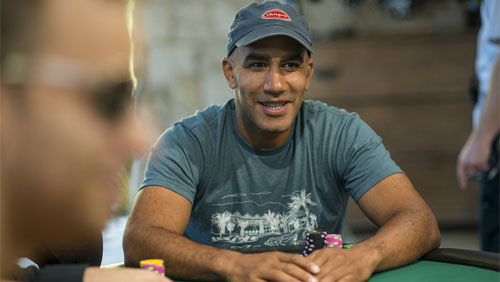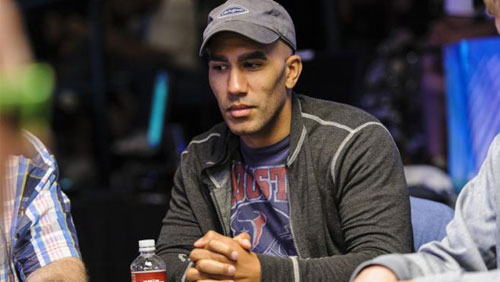Lee Davy talks with part-time poker player, full-time top man, Bill Perkins about his views on learning, forgiveness and love.
*To download this audio, right click and save link as*
How do I become a millionaire?
You talk to millionaires. 
And then we opened the door and walked inside. Bill Perkins was standing by a window that overlooked the Atlantic Ocean. His assistant was sitting at a table tapping away. Two women pottered about the place. They had roles. I didn’t know what they were. Jeff Gross was moving around the room like Spielberg, camera in hand, with the green light buzzing.
A group of guys walked out, and my son and I walked in. One of them had a big-ass afro – the type you stick a comb in to make you look cool. It turns out he was a bad boy rapper and had come to Perkins to ask him for advice on poker.
I was here to ask him a few questions on learning, forgiveness and love.
Learning
“I’m good at taking abstract learning or abstract reasoning and taking things in one area and applying it to another,” says Perkins when I ask him why he chose ‘learning’ as one of the three things to focus on in 2018. “Most of my learning has been serendipitous, reading and then sparking my interest and doing research on that topic. I want to take a more deliberate approach this year. See what I may think interests me and spend hours learning more about it.”
And what interests Perkins, today?
“Right now, Deep Learning, Machine Learning and Programming is interesting, so I signed up for a Udacity course. But it can be anything. It maybe philosophy, but this is the first thing that sparked my interest, so I went for that.”
Of all the things that Perkins could choose, why this?
“We are starting to use it in our industry,” says Perkins referring to his work as a trader. “I have a guy who is running Google’s TensorFlow on somethings, and there are a lot of talk and applications I see daily whether it be self-driving cars, Chess and Go programs, medical field diagnostics, and programming. I want a hands-on approach and deeper understanding of what’s going on, what resources it requires and what benefits are there.”
You don’t get to rent a suite like this without some top-notch education whether paid for or not. I’m not saying that Perkins once held his cap out, but he had to have come from more humbling beginnings. What were the learning milestones for him?
“I went to an emotional intelligence class in Nevada. That was a big milestone,” says Perkins. “Various aspects in various stages of my life: engineering the math and logic that I applied to trading and options trading. EI is everything in your life. But it’s all about entertainment. You have food, shelter, water, the need for love and everything else is entertainment. If you’re learning astrophysics or deep learning, it’s a form of entertainment.”
One of the best books you will find on EI came from the unshakeable pen of Daniel Goleman. Goleman is a meditator, and I ask Perkins if he incorporates meditation into his learning?
“Only at night to help me go to sleep,” says Perkins. “My girlfriend is into it. The great thing about the world today is your access to technology, methods, learning, etc., is much easier to get. There are a couple of great meditation apps out there. I probably should be using meditation more.”
I’m not sure he needs it.
He seems a pretty chilled cat to me. Hardly, the tearful eyes of a dog that’s been flogged too much.
“It’s not a question of need,” asserts Perkins. “Most of us in the US left the operating on need issue a long time ago. I don’t operate on a need basis. I operate on a want basis. So, it’s a question of do I want more and more happiness, right?”
The left side of the brain is for thinking, and the right side is for feeling. I recently read about the journey into the middle. To learn to be capable of both thinking and feeling. Is this where Perkins wants to be?
“Certain concepts you can understand mathematically, others, although there is a rational and logical way to look at them they need to be explained in a way that you can emotionally process them,” says Perkins. “Without that, you can get into very bad situations. No amount of words or logic can prepare you for war. It’s something you have to viscerally experience, or someone is going to have to explain it to you in a way that you process it emotionally. Or loss of a child, being sick and not having health insurance. To get people to rally around what it is you have to do you need to be able to process it both rationally and emotionally.”
 So, what is Perkins here to do?
So, what is Perkins here to do?
“I don’t know,” says Perkins. “I am discovering what I am here to do. I just have ideas; I really don’t know. I am here to raise my children and have an impact on them; make their lives better, I’m here to enjoy life, be happy and to make other lives enjoyable. I don’t know. It’s a balance. It’s a question I don’t think I will ever get the answer to while I am living. I will just operate as if I know and search for that balance and enjoy it.”
Perkins has three kids (10, 13 and 26). I ask him how he manages to raise them in a balanced way given the opulent surroundings they find themselves in.
“Their environment is their environment whether they were born in a hut or are kings and queens,” says Perkins. “These are the cards they have been dealt. There are advantages and obstacles in being raised in a hut and being raised in opulence. We identify those and say these are the things you’re going to have to overcome. These are experiences you’re not going to have that other people will be more adapted to or trained for. If there is no power you may be pissed off and angry, and these other people – this is how they live. They get a bucket of water, heat it up and start a fire. We play the cards they are dealt and prepare them and hope they have the tools so they can adapt to all the challenges the world provides them.
“I encourage them to make mistakes. I’m very protective in various ways. I have girls. I don’t think you ever get it right. Being a parent is a lesson in failure. Nobody is perfect. You never get it right; you’re always learning. There is no preparation for being a parent. It’s a lifetime of worry.
“You start off worrying if they’ll come out healthy, then it’s fevers, first school, rejection, then emotions, then they leave the house, and you’re worried that they’re out drinking and could get into an auto accident. That fear and worry can send you bananas. You do your best. Every day your best is different. One day you flip your lid, the other day you’re great. All you can do is your best.”
Forgiveness
“With kids, you have to give them room to make mistakes. So you have to learn to forgive them. But you also have to learn to forgive yourself. Let things go. And instil that in them as well. You can hold on to things and start to describe yourself in ways that can sap your psyche and can become destructive.
“The line between shame and addiction is so blurred it’s one and the same. When you start off not forgiving yourself and saying I am bad instead of saying I did a bad thing it can cause a lot of problems. That’s one thing that I am a hawk about – what my kids say about themselves and other people.”
But why make ‘Forgiveness’ a 2018 goal?
“It’s extremely important,” says Perkins. “It dovetails into a lot of things. Being vindictive and holding onto things catches your future to events in the past. Is has in my life, and I have seen it happen in others. I am a Christian. The story of Christianity is one of forgiveness. It’s a very broad thing. A lack of it is super destructive.
“I am constantly forgiving people and practising it daily. Someone will break their word with you and disappoint you on a daily basis. I will be there at 5, and they’re not. I’m going to work out. They don’t. It’s difficult. People aren’t trained to keep their word; you’re not trained to keep your word, you break it to yourself, form opinions and judge. Forgiveness is not getting into the habit of saying I am one of these people who is late; I am a fat slob, I am a bad person, so I am going to keep drinking. That statement. That lack of forgiveness is the foundation for all sorts of destructive behaviour.
“You are going to have integrity breakdowns. Even machines do. Despite the best intentions and preparation, you will break down, and people will break down around you. You are going to have to learn to forgive yourself and other people.”
Forgiveness seems to be bound to integrity. I ask Perkins for a time where he has operated out of alignment with his integrity?
“I have been vindictive; held grudges,” admits Perkins. “I have been that person. First, you have to recognise that. Awareness. Then correcting and forgiving. You have the ability. The great thing about being human is adaptability. You may have done a bad thing, but that’s not who you are. You are a super multi-faceted adaptable machine, so that process is something that people need to learn and that can help you. Part of that process is forgiveness. You are not an idiot. You are not stupid. You had a breakdown. You are the most important person in the world to forgive.”
What is love?
“For me, I just say it’s a verb. It’s not a feeling. It’s something you describe of people’s actions,” says Perkins. “I choose love every year just more of it. If I am in a disagreement or an argument I want to come from a place of love; to reach an understanding rather than come at it saying you’re a fucking idiot. To come at it and demonstrate love in different ways. That’s what I want to do and express it. It’s not about writing love letters and putting in a lot of hearts; it’s about living the verb.
“For me, raising kids, one of the hardest parts is some of the things you’re doing is past their visibility. It’s around the corner. You’re showing love, and they don’t necessarily perceive it like that because they won’t know for seven, eight years. They get there and think Holy Fuck! That’s why my Dad did this..”
I hug the man.
We’re done.
And then I remember my boy’s initial question.
How do I become a millionaire?
You talk to millionaires.
So I ask Perkins if my 16-year old son can ask him a question and he obliges.
What made you want to get here? Asks my boy
“At the time there was this general idea that I could leverage my hours, and I could have a lot of freedom,” says Perkins. “I didn’t know what I wanted to do. I was chasing shit that I didn’t really like. I want this car and x, y and z; I didn’t really want those things, I knew the concept of the ability to have my time and do what I wanted with my schedule; that freedom, that was my motivating factor.
“I could have taken a different path. I got tricked into this level of success. If I knew what I knew now, I could have done it all without this money. On a different level. But probably more enriching. It’s the freedom, the bailout, the insurance policy for myself, friends and family. I am a walking insurance policy. There are other aspects and benefits, but if I am honest, I was tricked. Its the way the culture works. Now, I would have less motivation. I would have taken a path to have a super rich life without the money.”
 Jeff Gross gets interested and asks Perkins if he has a ‘number in mind’ that would provide him with all the experiences he wants to have in the world.
Jeff Gross gets interested and asks Perkins if he has a ‘number in mind’ that would provide him with all the experiences he wants to have in the world.
“Here is the answer I gave a long time ago,” says Perkins. “There was a financial planner we had. She asked me how much I wanted to earn a year to live and I said $60k per year. I don’t want to work, and I want to do whatever. She said you already have that now. So I was like, I want a Jag. I was thinking – 20-years ago – I could travel around, pay my bills, I lived in Texas, the cost of living was cheap. I was focused on making money and trading I didn’t think about the experiences I wanted to have or the impact I would make. I would watch movies and say I want a butler; I want a plane. I didn’t really want it. I was being trained to want it.
“It’s a calculation based on a lot of variables. It’s a constant balance – what do you want to experience and what do you need to have to experience these things. Otherwise, it’s an abstract video game, and you’re wasting your life. You’re just making a bunch of money, and you die and have wasted your life. Money is for experiences. The experiences I want that are hyper expensive. Will it be terrible if I don’t have them? No. But it’s worth going to work to try and get the money to do them. Once I don’t have anything I want to experience I will stop.
“I don’t enjoy anything singularly as much as hanging around with my kids and girlfriends. I enjoy making movies, but they are a loser. It’s entertainment and art for me. Charitable work is a net monetary loser. If I want to make an impact in people’s lives, I can do a bunch of work and send the money over there. So I go to work and do things for that. There are a few things that I do that I enjoy more than work. But work gives me positive yield the ability to do those things. Once that disappears there is no work for me.”
I ask Perkins if he is talking about societal conditioning?
“Advertising is very effective. It gets into the core of your psyche,” Perkins confirms. “The Corona commercials are trying to own the lifestyle. I thought about it. When you go to a beach, you order a Corona. Club – vodka owns that experience. Bar with cigars – scotch. Ads are training you. Kids see the cars, the babe and they make you want to drive that car and get the woman.
“I knew I wanted a car before I had driven a car. I felt douchey when I first got one of these cars. Then I drove it, and I fucking hated it. I couldn’t fit anything into it. It couldn’t handle potholes. I kept hitting the kerb. I’m not a car guy. I was trained to be a car guy.
“It’s overwhelming. A losing battle. I try to convince the children to be vegetarian. You are being trained. You don’t have to buy into it. They say Dad you’re weird. Eventually, they will come back and say wow my dad is right. These animals come out of a woman and for the first ten years, so they can adapt we program them. If it was 10k years earlier we would have programmed them differently. We train them how to get jobs, vote, follow laws – you program this individual and around ten they can pretty much make it. You can let them loose, and they are programmed to survive – what to eat, what to like, what to say, what to do, how to behave, do I kill this person or not? 10k years ago you may, today you won’t. You need this training to operate in the world, but it comes with a lot of brainwashing – things you like, how you want to be. You lose your raw, authentic self and what you really want. You have to get back in touch with that.
“It works to make the machine go around. On an individual basis, it doesn’t work. You ask kids what they want to do. They have no fucking clue. They have interests, and that’s it. There’s a whole bunch of stuff they’ve never been exposed to. We’re not going to go rushing to fire school or astronaut school. What your good at may not be what you want to do. It could be a curse. That’s not how I want to live my life. I am trying to introduce concepts and tools to my kids so they can adapt, operate in the world but discover what they want to do and choose that.”
And with that we leave.
Halfway down the corridor, my boy asks me if we can go back and have a photograph with him.
Off we scoot.
A millionaire.
A trader.
A filmmaker.
A poker player.
A father.
A role model.





